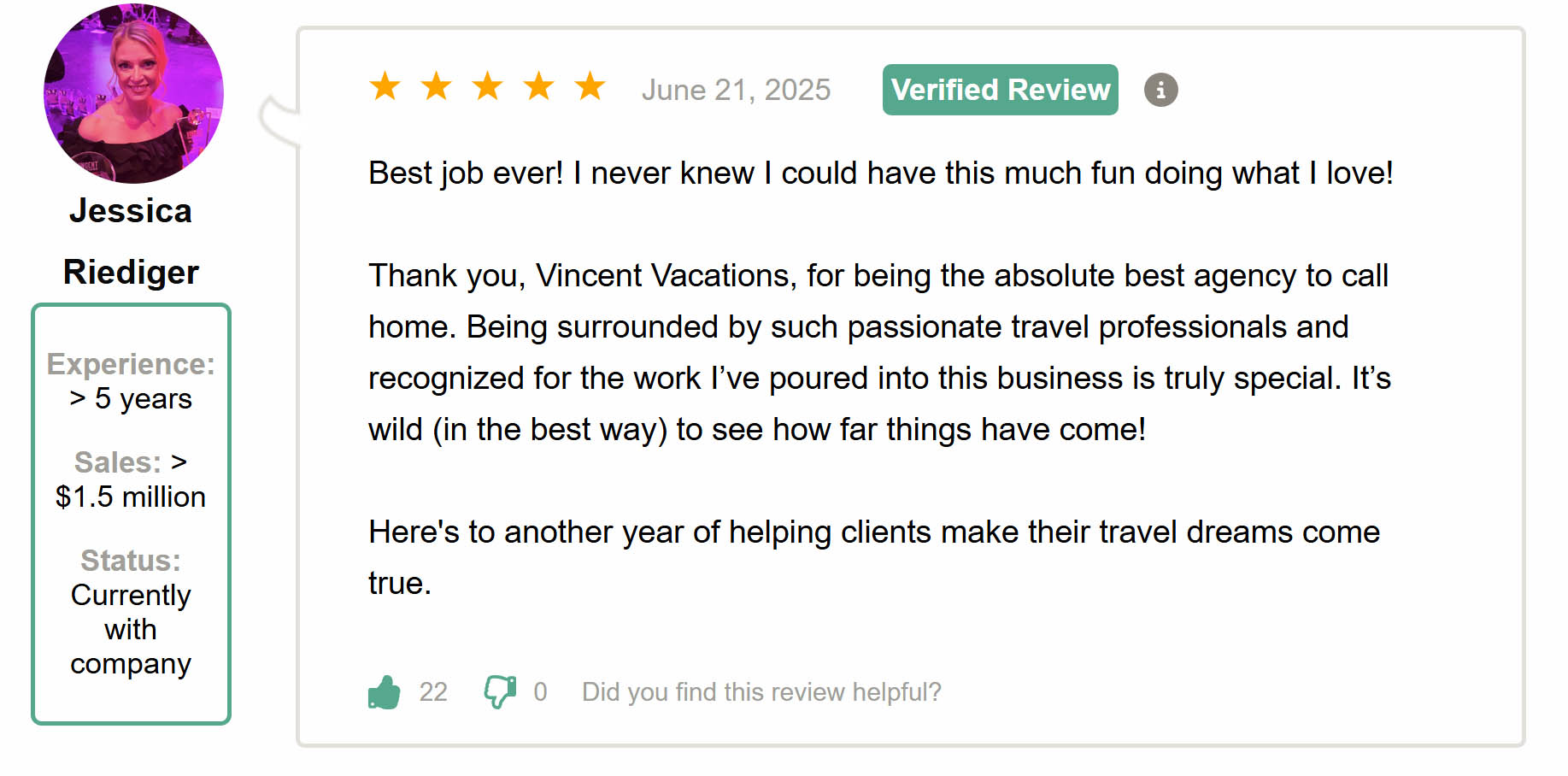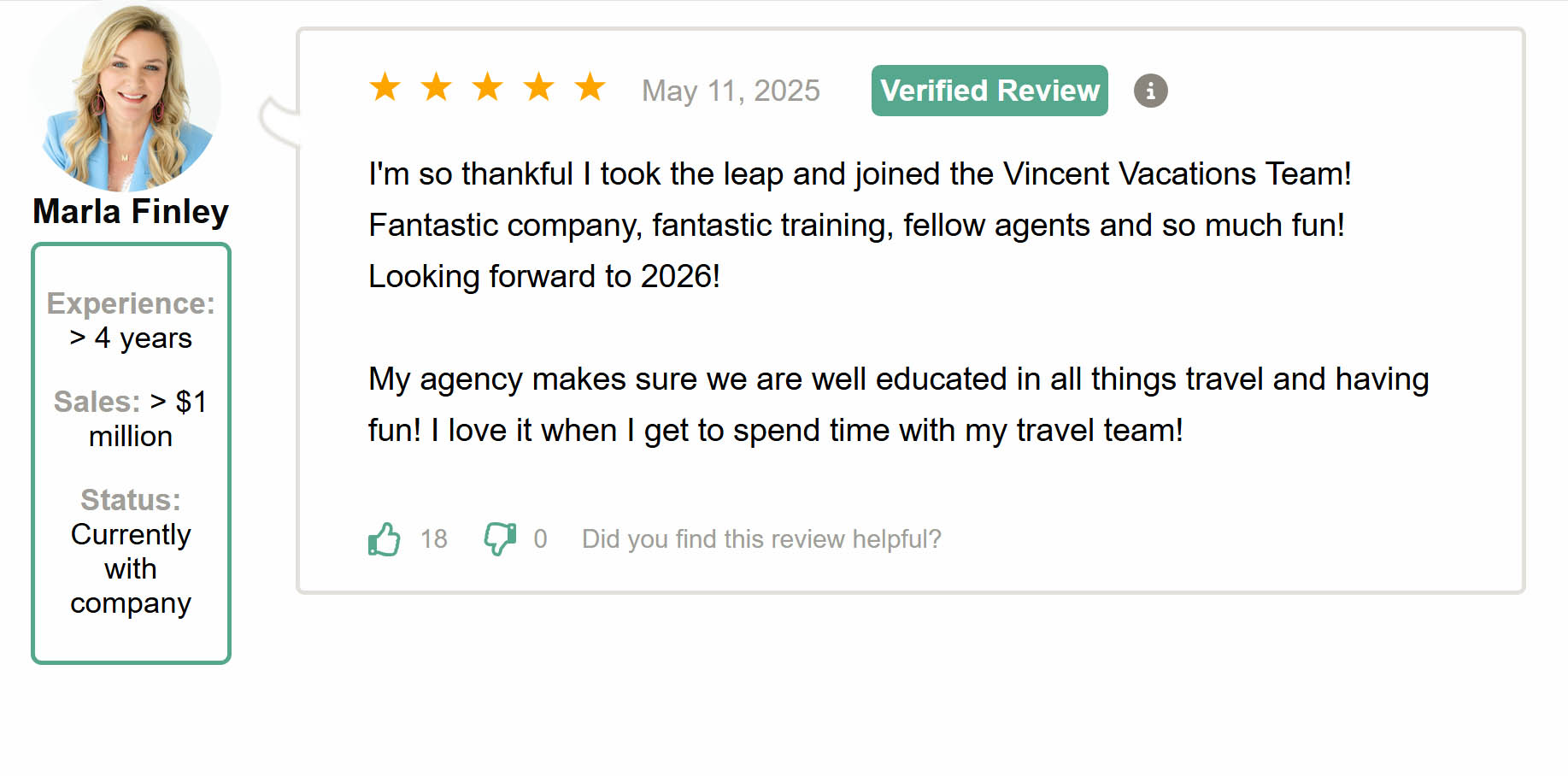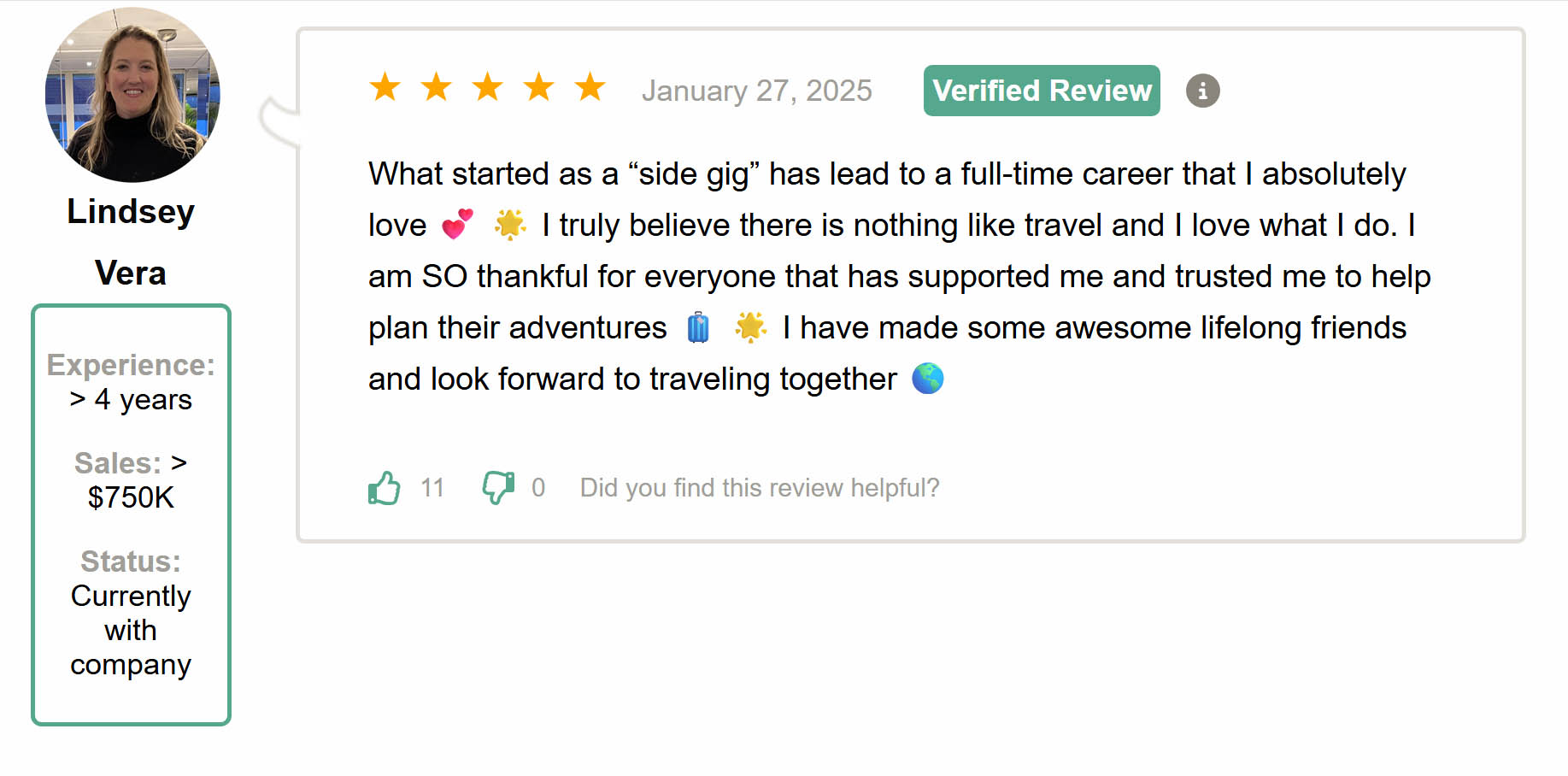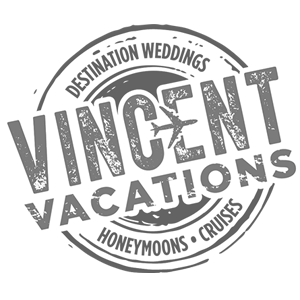What’s Different About Booking In 2025
To learn more techniques and how to become a travel agent, sign-up to become a travel agent today!
The landscape of travel booking is evolving rapidly as we approach 2026, bringing with it a wave of new challenges and exciting opportunities for travel agents.
Artificial Intelligence (AI) is no longer just a buzzword; it’s transforming how bookings are made, personalized, and managed. From smarter recommendation engines to automated customer service, AI is reshaping the way agents interact with clients and suppliers.
Ghosting has emerged as a significant behavioral trend impacting travel bookings. Clients sometimes disappear without notice during the booking process, creating uncertainty and requiring new strategies for follow-up and engagement. Understanding this phenomenon is crucial for travel agents striving to maintain strong client relationships in an era of instant digital communication.
Vincent Vacations
Build your own travel business. Launched by industry veterans, Vincent Vacations is working to carve out a niche as a boutique, community-driven option designed by advisors, for advisors.
Learn MoreMarketing Shifts and New Opportunities
The marketing landscape is shifting alongside consumer behavior. Traditional advertising is giving way to more targeted, data-driven campaigns that leverage social media influencers, interactive content, and AI-powered analytics. These tools help agents reach specific audiences with personalized messages that drive engagement and conversion.
“Travel agents who embrace these innovations and understand emerging customer psychology will unlock new opportunities for growth and success.”
In summary, 2025 promises to be a transformative year for travel agents. By leveraging AI, understanding ghosting and Gen Z psychology, and adapting to marketing shifts, agents can create more meaningful connections and offer truly tailored travel experiences. New opportunities abound for those ready to innovate.

The Evolving Role of Travel Agents in 2025
In 2025, the role of travel agents is undergoing a significant transformation. No longer seen as mere transactional bookers, agents are becoming experience curators who tailor journeys to meet the unique desires and expectations of each traveler. This change is driven by a combination of new technologies, evolving traveler psychology, and shifting market demands.
From Transactional Booking to Experience Curation
Travel agents today focus on more than just securing flights and hotels. They are deeply involved in crafting personalized travel experiences, blending cultural insights, local recommendations, and authentic moments that resonate emotionally with Gen Z and other savvy travelers. This approach requires agents to be creative storytellers and trusted advisors, guiding clients through choices that align with their values and aspirations.
Integrating Emotional Intelligence with AI Tools
While artificial intelligence streamlines many booking processes, travel agents in 2025 leverage AI as an assistant rather than a replacement. Agents use AI to analyze preferences and predict traveler needs, but the emotional intelligence of human agents remains vital. Understanding subtle client cues, empathizing with concerns, and managing expectations are areas where human touch outperforms algorithms.
How AI Enhances Emotional Intelligence
AI can provide data-driven insights such as preferred destinations, budget ranges, and past travel history, allowing agents to focus on the emotional and psychological aspects of travel planning. This synergy creates a more satisfying and personalized booking experience.
Guardianship Against Travel Uncertainties and Risks
In an era where travel disruptions—due to geopolitical issues, climate events, or health crises—are increasingly common, travel agents act as guardians for their clients. They offer real-time support, flexible rebooking options, and expert advice to mitigate risks and ensure peace of mind. This protective role enhances client trust and loyalty.
| Responsibility | Description | Benefit to Traveler |
|---|---|---|
| Experience Curation | Designing custom travel journeys tailored to personal tastes | More meaningful and memorable trips |
| AI Integration | Using AI tools to enhance personalization and efficiency | Faster, smarter booking with human empathy |
| Risk Management | Providing support during travel disruptions and uncertainties | Increased traveler confidence and safety |
Travel agents who embrace these new roles and adopt a mindset blending technology with emotional insight will unlock new opportunities in the vibrant travel market of 2025 and beyond.

AI and Technology Transforming Travel Bookings
As we approach 2025, the travel industry is undergoing a profound transformation fueled by artificial intelligence and cutting-edge technology. Travel agents are no longer just intermediaries; they are becoming experts equipped with AI-powered tools that enhance the booking experience for clients and open exciting new opportunities.
AI-Driven Itinerary Builders and Personalization Engines
AI-driven itinerary builders are revolutionizing how travel plans are created. These advanced engines analyze a traveler’s preferences, past behavior, and real-time data to craft highly personalized journeys. Instead of generic packages, agents can offer dynamic, tailored experiences that adapt instantly to changing conditions or traveler desires.
Blockchain for Secure and Transparent Bookings
Blockchain technology is empowering travel bookings with unprecedented security and transparency. By recording transactions in immutable ledgers, it reduces fraud and errors, enabling agents and clients to trust booking data more than ever.
"Blockchain brings clarity and trust to a complex supply chain of travel providers, ensuring every booking is verifiable and secure."
Additionally, smart contracts can automate payment releases and service confirmations, streamlining operations and minimizing delays.
Virtual and Augmented Reality for Destination Previews
Virtual Reality (VR) and Augmented Reality (AR) technologies allow travelers to explore destinations before booking. Agents can now offer immersive previews, letting clients virtually walk through hotels, landmarks, or cruise ships. This sensory experience helps build confidence and excitement, leading to higher booking rates.
| Benefit | Description |
|---|---|
| Enhanced Decision Making | Clients better understand what to expect, reducing post-booking dissatisfaction. |
| Increased Engagement | Interactive previews keep customers interested and emotionally connected. |
| Competitive Advantage | Agencies offering these experiences stand out in a crowded market. |
Vincent Vacations
Build your own travel business. Launched by industry veterans, Vincent Vacations is working to carve out a niche as a boutique, community-driven option designed by advisors, for advisors.
Learn MoreDynamic Pricing and Travel Subscription Models
Technology enables dynamic pricing that adjusts travel costs in real time based on demand, seasonality, and even individual traveler profiles. This flexibility helps agents offer competitive deals without sacrificing profitability.
Moreover, travel subscription models are emerging, where customers pay a regular fee for curated travel experiences, exclusive perks, or flexible booking options. This shift represents a new revenue stream and a closer ongoing relationship between agents and travelers.
Subscriptions encourage loyalty, predictability in revenue, and continuous engagement, all crucial in a rapidly evolving marketplace.

Shifting Travel Booking Behaviors and Trends
Understanding the evolving landscape of travel booking in 2025 is essential for travel agents aiming to stay ahead. The patterns of when, how, and why people book trips have changed dramatically, influenced by technology, lifestyle shifts, and global events.
Earlier Booking Windows and Increased Advance Planning
Travelers are increasingly planning their trips further in advance than in previous years. This shift is driven by a desire to secure the best deals and ensure availability in a competitive market. Agents can support clients by offering flexible options and early-bird incentives to capitalize on this trend.
Rise of Solo and Small Group Travel Preferences
Solo travel and small group excursions are becoming the norm, reflecting changing social dynamics and a craving for more personalized experiences. This trend opens opportunities for agents to craft tailor-made itineraries that cater to individual interests or close-knit groups seeking meaningful connections and adventures.
“Travelers are valuing quality over quantity, often opting for intimate journeys that offer deeper cultural immersion.”
Increased Demand for Travel Insurance and Risk Mitigation
The uncertainty of recent years has made travel insurance a priority for many. Clients are looking for peace of mind against cancellations, health emergencies, and unexpected disruptions. Travel agents who can offer comprehensive risk mitigation advice and insurance packages will build stronger trust and loyalty.
Why travel insurance matters more than ever
From fluctuating health guidelines to geopolitical concerns, travelers want reassurance that their investments are protected. Highlighting these benefits can be a key part of your consultation process.
Growth of Bleisure and Multi-Day Group Travel
Bleisure travel—combining business with leisure—has expanded significantly, especially among younger professionals. Additionally, multi-day group travel, including family reunions, corporate retreats, and special interest groups, is gaining momentum. Travel agents should focus on creating seamless, productive, and enjoyable packages that balance work and play.
| Aspect | Description | Agent Opportunity |
|---|---|---|
| Bleisure Duration | Extended stays beyond business commitments | Offer leisure add-ons and local experiences |
| Multi-Day Groups | Travel involving family, friends, or colleagues | Coordinate group logistics and customized itineraries |
| Experience Focus | Blending work needs with cultural or recreational activities | Design balanced schedules to maximize satisfaction |
By embracing these shifting behaviors and trends, travel agents can unlock new opportunities to engage clients meaningfully and differentiate their services in a competitive marketplace. Staying informed and adaptable will be key to thriving in 2025 and beyond.
Become a Travel Agent: Unleash Your Full Potential
Ready for a career that's as fulfilling as it is rewarding? Becoming a travel agent with Vincent Vacations means building a business around your passion for travel.

Gen Z Psychology and Its Impact on Travel Booking
Understanding Gen Z's mindset is crucial for travel agents aiming to engage this dynamic generation effectively. Born roughly between 1997 and 2012, Gen Z travelers bring unique preferences and expectations shaped by their upbringing in a digitally connected and socially conscious world.
Values-Driven Travel: Sustainability and Authenticity
Gen Z travelers prioritize sustainability and seek authentic experiences that reflect their values. They are more likely to choose destinations and accommodations that demonstrate environmental responsibility and social impact. Eco-friendly practices, support for local communities, and genuine cultural immersion are key factors influencing their booking decisions.
Preference for Hyper-Personalized and Unique Experiences
Rather than standard packages, Gen Z craves tailored travel experiences that feel unique and personal. This generation values customization, from curated itineraries to niche activities that resonate with their individual interests. Travel agents who leverage data insights and actively listen to client preferences can craft offerings that stand out.
Example: A personalized adventure combining local art workshops with eco-trekking tours
This blend offers a meaningful, one-of-a-kind journey that typical tours may not provide.
Digital Natives Expecting Seamless Tech Integration
As true digital natives, Gen Z travelers expect smooth integration of technology throughout their booking journey and trip experience. This includes mobile-first booking platforms, instant communication channels (like chatbots or social media), and digital tools for real-time updates or virtual previews.
“Travel that doesn’t leverage technology feels outdated to Gen Z.”
Agencies that invest in AI-driven recommendations and user-friendly apps meet Gen Z’s demand for efficiency and convenience.
Psychological Drivers Behind Travel Choices and Loyalty
Gen Z’s travel decisions are influenced by psychological needs such as self-expression, social connection, and meaningful engagement. They often share their experiences on social media, seeking validation and community. Loyalty is built when brands align with their identity and values, offering trust and genuine interaction rather than just discounts.
| Driver | Impact on Travel Booking |
|---|---|
| Self-expression | Prefers unique, customizable trips that reflect personality |
| Social connection | Chooses travel that fosters group experiences and sharing |
| Meaningful engagement | Seeks purposeful travel supporting causes or cultural learning |
Travel agents who understand and address these psychological motivators can foster lasting loyalty and create advocates among Gen Z clients.

Marketing Shifts for Travel Agents in 2025
Leveraging AI for Targeted and Predictive Customer Outreach
In 2025, artificial intelligence (AI) will play a transformative role in how travel agents engage with their customers. By analyzing vast amounts of data, AI can help deliver highly targeted and predictive outreach that anticipates traveler needs and preferences. This means agents can send personalized travel recommendations, special offers, and timely reminders that feel intuitive and relevant, increasing customer satisfaction and loyalty.
Building Community and Trust Through Authentic Content
Trust is the cornerstone of successful travel planning. In 2025, travel agents will shift towards creating authentic, relatable content that fosters community among travelers. This includes sharing real stories, testimonials, behind-the-scenes looks at destinations, and interactive experiences. Such genuine content nurtures a sense of belonging and reliability, helping agents stand out in a crowded market.
“Authenticity builds trust, and trust drives bookings.”
Using Data Analytics to Optimize Campaigns and Offers
Data analytics will be indispensable for travel agents looking to maximize their marketing impact. By tracking campaign performance, customer behavior, and market trends, agents can fine-tune their offers to better meet demand. This data-driven approach enables timely adjustments, improved ROI, and a more agile marketing strategy that responds to changes faster than ever before.
| Benefit | Description |
|---|---|
| Campaign Optimization | Identifying which messages and channels resonate best with clients |
| Personalized Offers | Creating tailor-made packages based on customer preferences |
| Market Trend Analysis | Adjusting strategies based on emerging travel behaviors |
Vincent Vacations
Build your own travel business. Launched by industry veterans, Vincent Vacations is working to carve out a niche as a boutique, community-driven option designed by advisors, for advisors.
Learn MoreAdapting to New Consumer Touchpoints and Social Platforms
The landscape of consumer interaction is constantly evolving. In 2025, travel agents need to be agile in adopting new social platforms and touchpoints where their audience spends time. This includes emerging apps, video-based channels, and interactive forums that appeal especially to younger travelers like Gen Z. Engaging content tailored to these platforms helps agents build meaningful relationships and capture interest early in the travel decision process.
Tip: Experimenting with short-form video, live Q&A sessions, and influencer partnerships can create fresh opportunities for connection and conversion.

Addressing the Challenge of Ghosting in Travel Booking
Understanding Ghosting Behavior Among Travelers
Ghosting refers to when travelers suddenly disappear during the booking process or fail to show up for their trip without any notice. This behavior can stem from a variety of reasons including changing plans, anxiety about travel, or simply a lack of accountability. For travel agents, understanding these underlying causes is crucial to tailoring communication and services that resonate with the traveler’s mindset.
Strategies to Reduce No-Shows and Last-Minute Cancellations
Implementing clear booking policies and transparent cancellation terms helps set expectations early. Offering incentives for early confirmations or deposits can increase commitment. Furthermore, personalized reminders via SMS or email, sent at strategic intervals, reinforce engagement and reduce forgetfulness.
Explore effective booking policies
Examples include non-refundable deposits, tiered cancellation fees, or offering flexible rescheduling options. These strategies encourage travelers to be more deliberate and accountable.
Building Engagement and Accountability with Clients
Creating a warm, trustworthy relationship is key. Agents can foster this by actively listening, providing tailored advice, and sharing insider tips that make clients feel valued. Using interactive tools like live chat or video calls enhances connection, building a rapport that discourages ghosting.
"When clients feel personally connected, they are more likely to honor their commitments and communicate openly."
Additionally, setting mutual expectations at the outset and following up with positive reinforcement helps build a foundation of accountability.
Technological Solutions to Monitor and Predict Ghosting Risks
Advanced booking platforms now incorporate AI-driven analytics to spot patterns indicating potential no-shows. These tools analyze past behavior, engagement levels, and even social signals to forecast ghosting risks.
| Feature | Benefit |
|---|---|
| Automated Reminders | Keeps travelers informed and engaged |
| Risk Scoring Algorithms | Identifies high-risk bookings for proactive follow-up |
| Real-Time Communication Tools | Enables instant dialogue to resolve doubts |
With these technological advancements, travel agents can not only reduce ghosting but also tailor their marketing and engagement efforts to better suit the evolving psychology of travelers in 2025.
For Both Aspiring and Experienced Travel Advisors
Build a travel business doing what you love - on your own terms. Start booking trips the day you join, with a best-in-class education curriculum developed by industry experts.

New Opportunities for Travel Agents in 2025
As the travel industry evolves rapidly, 2025 presents exciting new opportunities for travel agents to adapt and thrive. Emerging trends and shifting traveler preferences open doors to specialized markets and innovative business models that agents can leverage for growth.
Niche Markets: Eco-Tourism, Wellness, and Experiential Travel
Travelers are increasingly seeking meaningful and responsible travel experiences. This trend has fueled demand in eco-tourism, wellness retreats, and experiential travel that connects guests deeply with local cultures and nature.
“Niche markets like these allow travel agents to offer personalized, value-driven trips that go beyond the typical tourist itinerary.”
Agents specializing in these areas can build strong client loyalty by curating trips that emphasize sustainability, health, and authentic experiences.
Cross-Selling Packages: Bundling Flights, Hotels, and Activities
One of the most effective strategies in 2025 will be cross-selling bundled travel packages. By combining flights, accommodations, and unique activities into seamless offers, agents provide convenience and value to clients.
Using data analytics, agents can tailor bundles to fit individual preferences, ensuring each package feels customized and appealing.
Corporate and Bleisure Travel as Growth Segments
Corporate travel is rebounding with an added twist: the rise of bleisure travel, where business travelers extend trips for leisure purposes.
| Segment | Focus | Opportunity for Agents |
|---|---|---|
| Corporate Travel | Business trips, meetings, conferences | Streamlined booking, loyalty programs |
| Bleisure Travel | Extended leisure stays post-business | Bundling leisure activities, personalized offers |
Agents who understand the nuances of these segments can create specialized services that cater to busy professionals seeking efficiency and relaxation.
Utilizing SaaS Platforms for Streamlined Operations
Technology will be a key enabler for travel agents in 2025, with SaaS (Software as a Service) platforms offering tools that simplify booking, client management, and marketing automation.
Benefits of SaaS for Travel Agents
- Real-time inventory and pricing updates
- Automated customer communications and follow-ups
- Data-driven insights for targeted marketing
- Integration with multiple suppliers and services
Embracing these platforms allows agents to focus more on relationship building and less on administrative tasks, creating a more agile and responsive business model.
In summary: Travel agents who explore niche markets, master cross-selling, tap into corporate and bleisure segments, and adopt advanced SaaS tools will position themselves for success amidst the evolving landscape of 2025.

Optimizing Travel Bookings with Data-Driven Insights
In the rapidly evolving travel industry of 2025, data-driven insights have become indispensable for travel agents looking to stay ahead. Harnessing data not only helps identify new trends but also enables agents to tailor experiences that resonate deeply with their clients’ preferences and behaviors.
Using Search and Booking Data to Identify Emerging Destinations
By analyzing massive volumes of search queries and booking patterns, travel agents can spot emerging destinations before they become mainstream. This early detection offers a competitive edge, allowing agents to recommend fresh and exciting locations to travelers seeking novel experiences.
Personalizing Offers Based on Traveler Profiles and Preferences
Personalization is key in 2025. Travel agents are now leveraging AI-powered algorithms to create customized offers that align perfectly with individual traveler profiles, including their past trips, budget, interests, and even subtle psychological factors like motivation and travel style.
“Understanding Gen Z’s preference for authentic, socially conscious travel has transformed how we package our offers,” says a leading travel consultant.
Such personalized marketing not only improves customer satisfaction but also boosts conversion rates by presenting travelers with options they are more likely to embrace.
Forecasting Demand and Pricing with Predictive Analytics
Predictive analytics tools are revolutionizing how travel agents forecast demand and optimize pricing strategies. By integrating historical data, current booking trends, and external factors like economic indicators or geopolitical events, agents can anticipate demand shifts and adjust prices dynamically to maximize revenue.
| Benefit | Impact |
|---|---|
| Demand Forecasting | Improves inventory management and reduces overbooking |
| Dynamic Pricing | Maximizes profitability while remaining competitive |
| Market Trend Analysis | Allows quick adaptation to changing traveler behaviors |
Explore how predictive analytics works in practice
By feeding algorithms with real-time booking data and external variables, travel platforms generate demand curves that guide pricing decisions. This means prices can be optimized daily or even hourly, reflecting genuine market conditions.
Embracing these data-driven strategies empowers travel agents to transform their business models, ensuring they remain relevant and highly effective in the competitive 2025 travel landscape. Data is no longer just numbers — it’s the key to unlocking new opportunities and deeper client relationships.

Sustainability and Ethical Considerations in 2025 Travel Bookings
As travel evolves in 2025, sustainability and ethics are becoming central to how agents book trips. This shift reflects growing traveler awareness about the impact of their journeys and the responsibility of the industry to promote greener, fairer tourism.
Promoting Carbon-Neutral and Low-Impact Travel Options
Travel agents now have a unique opportunity to highlight carbon-neutral and low-impact travel choices when assisting clients. This includes recommending airlines with carbon offset programs, eco-friendly accommodations, and transportation methods that minimize environmental harm.
Vincent Vacations
Build your own travel business. Launched by industry veterans, Vincent Vacations is working to carve out a niche as a boutique, community-driven option designed by advisors, for advisors.
Learn MoreBenefits of Carbon-Neutral Travel
- Reduces greenhouse gas emissions
- Supports conservation projects
- Raises awareness about climate change
Educating Travelers on Responsible Tourism Practices
Empowering travelers with knowledge about responsible tourism is essential. Agents can share guidelines on respecting local cultures, wildlife, and natural habitats to ensure tourism benefits communities without causing harm.
"Travel is about connection and respect, not just sightseeing."
Providing easy-to-understand resources or links to organizations promoting sustainable tourism helps clients make informed decisions that align with their values.
Partnering with Sustainable Suppliers and Destinations
Building strong relationships with sustainable suppliers and destinations is another key strategy. Travel agents can curate a network of partners who prioritize eco-friendly operations and social responsibility, ensuring that clients’ bookings contribute positively to the places they visit.
| Partner Type | Focus Area | Agent Benefit |
|---|---|---|
| Eco-Lodges | Energy-efficient operations, local community support | Unique experiences with ethical impact |
| Green Tour Operators | Low-impact excursions, wildlife conservation | Responsible activity options for clients |
| Carbon Offset Providers | Investment in reforestation, clean energy | Offset client travel emissions easily |
By integrating these sustainability and ethical considerations, travel agents not only meet the expectations of conscientious Gen Z and beyond, but also open new avenues for meaningful marketing and client loyalty.
From Passion to Profit
Vincent Vacations provides unparalleled benefits to both new and experienced travel agents. We empower you to deliver exceptional value to your clients and elevate your career.

Adapting to Global and Geopolitical Changes Affecting Travel
As the travel landscape evolves rapidly, travel agents must remain vigilant and adaptive to the global and geopolitical shifts that directly impact their clients' journeys. Understanding these changes is essential for providing exceptional service and ensuring safe, smooth travel experiences.
Navigating Travel Restrictions and Policy Shifts
Travel restrictions are no longer static; they change frequently due to political developments, health crises, and security concerns. Agents need to stay informed about visa requirements, quarantine mandates, and entry bans that vary by country and can change with little notice.
Implementing flexible booking policies and offering alternatives can help manage uncertainty. Clients appreciate transparency and contingency plans, reducing anxiety about sudden travel disruptions.
Cultural Interpretation and Crisis Management for Travelers
With geopolitical tensions rising in some regions, cultural sensitivity and crisis management skills become critical for travel agents. Educating travelers about local customs, political climates, and potential risks adds value and builds trust.
“Empowering clients with knowledge fosters confidence and helps prevent misunderstandings or inadvertent offenses during their travels.”
Agents should also prepare clients for possible emergencies by advising on emergency contacts, embassy locations, and protocols for evacuation or medical assistance. Clear communication channels and pre-trip briefings are vital components of effective crisis management.
Incorporating Safety and Health Protocols into Bookings
Health and safety protocols remain a cornerstone of travel planning in 2025. Beyond basic hygiene measures, agents must integrate vaccination requirements, testing mandates, and local health regulations into the booking process.
| Protocol | Agent Action | Client Benefit |
|---|---|---|
| Vaccination Verification | Confirm and document proof during booking | Seamless entry at destinations |
| Pre-Departure Testing | Inform clients of accepted test types and timing | Compliance with airline and country rules |
| Quarantine Rules | Advise on duration and facilities | Avoid unexpected delays and expenses |
Incorporating these protocols not only ensures compliance but also enhances traveler confidence in their safety, encouraging continued travel engagement despite uncertainties.
Additional Resources for Travel Agents
Sources such as the World Health Organization, International Air Transport Association, and government travel sites offer up-to-date guidance relevant for booking practices and traveler advisories.

Conclusion: Embracing the New Era of Travel Booking in 2025
The landscape of travel booking is undergoing a profound transformation in 2025, shaped by advancements in AI, evolving customer behaviors like ghosting, and the unique psychology of Gen Z travelers. Travel agents who adapt to these changes will unlock exciting new opportunities to connect, engage, and grow their business.
At the same time, understanding Gen Z psychology is essential. This generation values authenticity, instant communication, and meaningful experiences over mere transactions. Recognizing tendencies like ghosting — where potential clients may suddenly disengage — helps agents tailor follow-up strategies with empathy and creativity.
Marketing Shifts and New Opportunities
Marketing in 2025 demands agility and innovation. Social media trends, influencer partnerships, and immersive content such as virtual tours are now key tools. Agents who embrace these shifts can capture attention in crowded markets and build lasting relationships.
Moreover, new niches and services are emerging, from eco-conscious travel packages to remote work-friendly destinations. This diversification opens up avenues for agents to differentiate themselves.
“The future belongs to those who prepare for it today.” – emphasizing that travel agents who invest in learning and adapting will thrive amidst change.
| Focus Area | Why It Matters | Action Steps |
|---|---|---|
| AI Integration | Enhances personalization and efficiency | Adopt AI tools for client profiling and booking automation |
| Understanding Gen Z | Builds rapport with emerging traveler demographics | Engage authentically, use preferred communication channels |
| Managing Ghosting | Mitigates lost leads and frustration | Implement flexible follow-up and re-engagement strategies |
| Marketing Innovation | Captures attention in a competitive market | Leverage social media, influencers, and immersive content |
| Exploring New Niches | Differentiates service offerings | Develop packages for eco-tourism, remote work travel, etc. |
In summary, travel agents who embrace technology, understand shifting consumer behaviors, and innovate their marketing approaches will not only survive but flourish in 2025 and beyond. The future of travel booking is dynamic and full of promise — a journey best navigated with openness, agility, and a commitment to creating unforgettable experiences.
Ready to embrace the future? The possibilities await!
Learn more about this by signing up for one of our online trainings Learn More
To learn more techniques and how to become a travel agent, sign-up to become a travel agent today!






